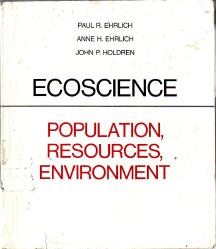White House Science Adviser Advocated 'De-Development' of the United StatesBy Christopher NeefusCNS News Aug. 01, 2009 |
Popular 
Video Shows Israeli Soldiers 'Using Palestinian as a Human Shield'

BlackRock CEO: 'Xenophobic' Countries With Shrinking Populations May Be The 'Big Winners' in AI-Driven Future

Report: Daily Wire Got Secret Gag Order Against Candace Owens 'While Publicly Negotiating a Debate'

WATCH: Sheryl Sandberg's Vile 'Hamas Mass Rape' Documentary Debunked by Electronic Intifada

House Passes 'Antisemitism Awareness Act' to Silence Criticism of Israel as Hate Speech
  (CNSNews.com) – President Obama’s top science adviser, John P. Holdren, advocated the "de-development" of the United States in books he published in the 1970s. (CNSNews.com) – President Obama’s top science adviser, John P. Holdren, advocated the "de-development" of the United States in books he published in the 1970s."A massive campaign must be launched to restore a high-quality environment in North America and to de-develop the United States," Holdren wrote in a 1973 book he co-authored with Paul R. Ehrlch and Anne H. Ehrlich. "De-development means bringing our economic system (especially patterns of consumption) into line with the realities of ecology and the global resource situation." In the vision expressed by Holdren and his co-authors, the Ehrlichs, the need for "de-development" of the United States demanded a redistribtuion of wealth. "The need for de-development presents our economists with a major challenge," they wrote. "They must design a stable, low-consumption economy in which there is a much more equitable distribution of wealth than in the present one. Redistribution of wealth both within and among nations is absolutely essential, if a decent life is to be provided to every human being." Holdren, who is director of the White House Office of Science and Technology Policy, made these comments in the 1973 book "Human Ecology," which he co-authored with the Ehrlichs, long-time advocates of curtailing population growth. Over the years, Holdren has co-authored or co-edited a number of books and articles with Paul Ehrlich. In the 1977 science textbook, "Ecoscience: Population, Resources, Environment," which Holdren also co-authored with the Ehrlichs, the authors again presented their idea for "de-development." The 1973 book, "Human Ecology," argued that humanity would face environmental calamity if population growth was not curbed. The authors' call "to de-develop the United States" came in the book's final chapter, under the heading, "Synthesis and Recommendations." In "Ecoscience," which was used as a college textbook, Holdren and his coauthors expanded on the notion of de-development. The book contains lengthy chapters on natural processes like nutrient cycles and energy consumption as well as information on global demographics and the nature and history of world hunger. There are also chapters detailing potential ways to remedy what the authors perceived as the problem of overpopulation, including restructuring American and international institutions. In a chapter entitled “Rich Nations, Poor Nations, and International Conflict,” Holdren and the Ehrlichs wrote: “The most critical change of all must be a change in goals; all people, rich and poor alike, must come to recognize that being a citizen of a giant, smoggy, freeway-strangled industrial state is not necessary to being a happy, healthy, fulfilled human being.” According to the authors, developed countries should not “train their own people to think of the power lawn mower and automatic icemaker as the finest achievements of humanity.” “It is therefore apparent,” they said, “that one key to saving world society lies in a measured and orderly retreat from overdevelopment in today’s ODCs (overdeveloped countries)--a process we will label, for want of a better word, de-development.” The Ehrlichs have called "Ecoscience" an "encyclopedic textbook where description can be misrepresented as endorsement.” But Holdren and his co-authors plainly depict the de-development of industrialized nations as a global policy priority. “As we see it, de-development of the ODCs should be given top priority,” they wrote on page 926. “Only when that course is firmly established, will there be any real hope for all of humanity to generate a worldwide spirit of cooperation rather than competition and to plan the development of our (planet) with the holistic perspective that is so essential to the survival of civilization," they wrote. "Only then can consumption in the (less developed countries) be linked both psychologically and physically to production in the ODCs and a substantial transfer of wealth accomplished.” On the following page, the authors lamented that some scientists and engineers, who they labeled “technologists,” would reject their idea of de-developing countries like the United States: “Angry opposition to de-development can be expected from some technologists who are used to having their schemes for progress accepted without question by a dazzled public," the authors wrote. "SSTs (solid state technologies), space colonies, thermonuclear weapons and delivery systems, geodesic domes over cities, fission power, giant automobiles, plastic wrappings, genetic engineering, disposable packages and containers, synthetic pesticides, and the like are supposed to be accepted as self-evidently desirable.” They added: “However, many technologists now correctly perceive that, if the ODCs are to be de-developed and civilization is to persist, the halcyon days of unquestioning public acceptance of technological ‘progress’ must disappear forever.” Holdren and the Ehrlichs predicted that "the planet almost certainly cannot support even 4 billion people with the material throughput per person associated with, say, the United States or West Germany today. “The task thus becomes one of diverting people from pursuing that material-intensive and environmentally unsustainable lifestyle,” they said. “The only way to divert the rush in the LDCs to mimic overdevelopment is to change the model--to trim from the lifestyle and supporting technology of the ODCs their energetic and material profligacy while increasing the quality of life.” In addition to being director of the White House Office of Science and Technology Policy (OSTP), Holdren is also President Obama’s top science adviser. He is a major voice in the administration on both climate-change policy and health care reform. According to the 1976 bill that created the OSTP, it is meant to “serve as a source of scientific and technological analysis and judgment for the President with respect to any major policies, plans, and programs of the Federal government.” Before joining the Obama administration, Holdren was a professor at Harvard and the director of the Woods Hole Research Center in Falmouth, Mass. He holds a Ph.D. from Stanford University and an M.S. from MIT, where he also received his undergraduate degree. The White House Office of Science and Technology Policy did not comment on questions from CNSNews.com about Holdren’s stance on de-development or whether it has changed since the 1970s. |



